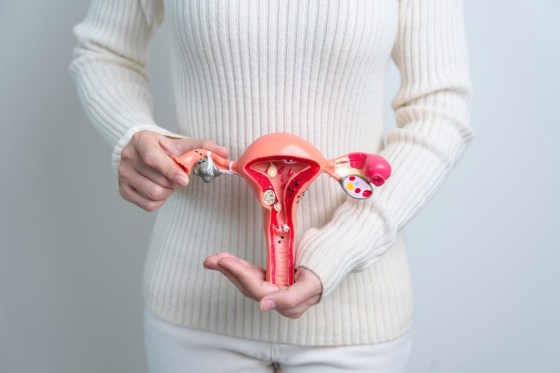
So what is Endometriosis?
Understanding Endometriosis, like its hard-to-pronounce name by itself is a challenge of sorts.
One of the most common yet often misunderstood gynaecological disorders affecting women, it is a condition that occurs when tissues that look exactly like the uterus lining, begin to grow outside the uterus, causing painful symptoms and possible complications. Simply put, the tissue has no way to leave the body, causing rash and scars and extremely painful lesions. When it is developed in ovaries, it is also referred popularly as a ‘chocolate cyst’.
What you need to be cautious about is that endometriosis is a chronic condition, and it is found in other parts of the reproductive organs, such as the wall of the uterus {adenomyosis}, the fallopian tubes, the pelvis and peritoneum, in the area between the vagina and rectum and most commonly, the ovaries.
It is very common condition, affecting 1 in 10 women. You are more likely to develop endometriosis if your mother or sister has had it, as it can be a long-term condition that can have a significant impact on your general physical health, emotional wellbeing and daily routine.
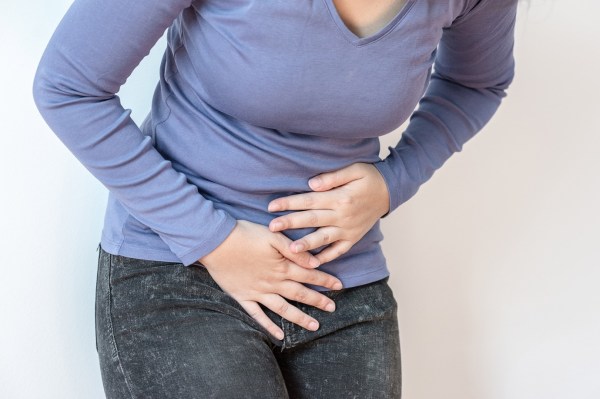
We have 2 documented cases of patients who underwent complications resulting from endometriosis and how they were treated (actual names undisclosed for privacy):
Raphael, a real estate executive who had been living in the UAE for 18 years, was diagnosed with sharp shooting pelvic pain that completely threw her working life off-gear. After being diagnosed with endometriosis, a laparoscopic procedure was advised to remove any sort of cystic growth. After the operation, she is now a happier and healthier version of herself, and our gynaecologists at HealthHub Clinics have advised lifestyle changes to ensure she maintains her health.
One of our patients, Alisha, a 29-year-old professional based in Al Barsha, bright and bubbly marketing executive was facing issues in conceiving. Further diagnoses revealed that she was suffering from a severe case of endometriosis. Our doctor’s recommendations were two-fold: laparoscopic surgery, after which an IVF treatment was proposed. Looking back, Alisha has come a long way to being a happy mom of a budding 2-year-old healthy girl today!
Symptoms of Endometriosis:
It’s a red flashing sign, if you notice any of these symptoms:
• Severe, crippling back pain while during your period
• Menstrual cramps with increasing severity that last long
• Painful irregular or heavy bleeding
• Experiencing pain while passing urine or motions (during your period), followed by spots of blood in your urine or stools
• Extreme cases of loose motion or constipation
• Fatigue that won’t go away
• Infertility issues
• Chronic fatigue and tiredness
• Pain during or after sex
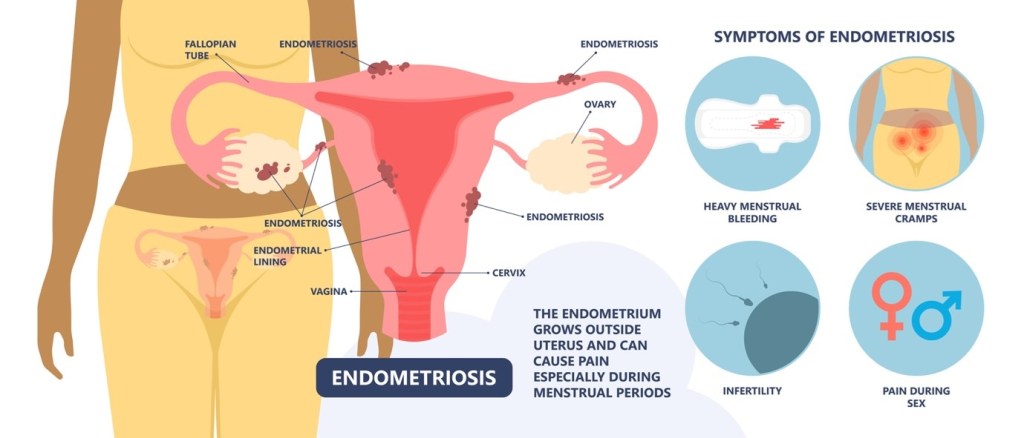
What Causes Endometriosis?
Over 170 million people worldwide, fall prey to Endometriosis every year and there is no definite cause according to study in International Journal of Environment Research & Public Health in 2020. There are also reasons like ignorance or a kind of dismissive bias towards women’s health. While its exact cause has not been fully established, there are certain patterns that have been identified which could be contributing to the causes:
Hormonal Imbalances:
Levels of imbalance in the estrogen will stimulate the growth of endometrial tissue.
Embryonic cell transformation:
The estrogen levels may transform embryonic cells in the earliest stages of its development, into endometrial-like cell implants during puberty.
Here’s what a close-up of a cell inside the tissue would look like:
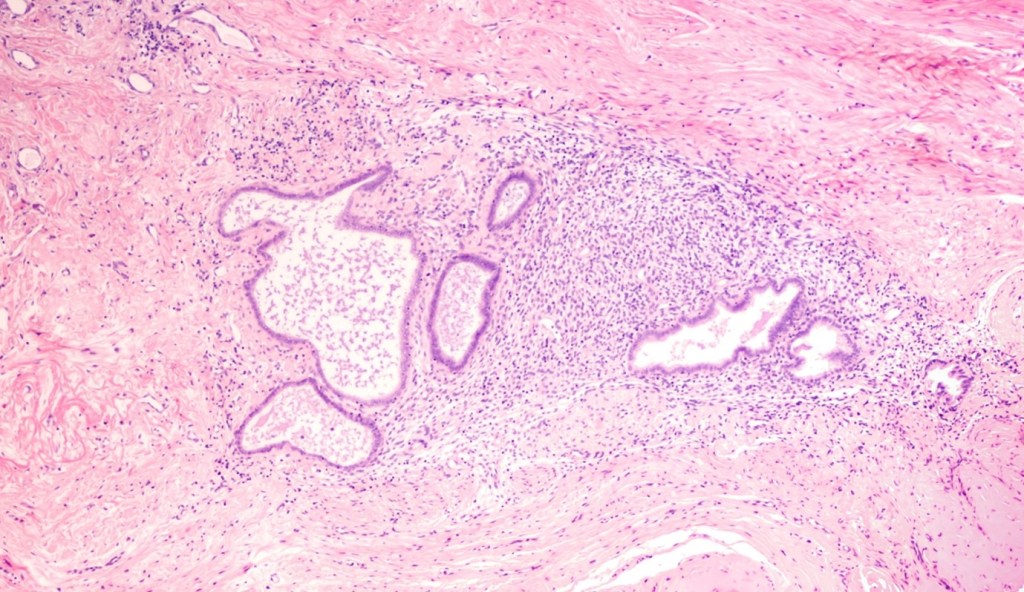
Retrograde Menstruation:
This is a kind of a much-debated symptom suggesting that blood tends to flow backward (during menstruation) through the fallopian tubes and into the pelvic cavity, where it can implant and grow.
Affected immunity:
If you’ve been facing immunity disorders, you may fail to identify and target endometrial-like tissue that grow outside the uterus.
Hereditary history:
Studies seem to indicate that Endometriosis could have a genetic link especially among women whose family members or relatives suffer from it, indicating its spread across the gene pool.
So in sum, your genes play a key role, which means if your sister, mother or grandmother, suffer from endometriosis, there’s a high possibility that it could be passed on to you. What makes it worse is that the intensity and spread seem to increase with each passing generation in your family.
Transformation of peritoneal cells:
Research scientists tend to believe that hormones or the levels of immunity and disorders promote transformation of peritoneal cells that line the inner side of your abdomen, into endometrial-like cells.
Watch out for Surgical scars:
This involves surgical scar implantation, where after a surgery, such as a hysterectomy or C-section, endometrial cells may attach itself to a surgical incision.
There’s no one-size-fits-all approach, if one were to see the earlier two case histories in the beginning of this article. That’s why our team of gynaecologists would recommend a multi-disciplinary approach to treating endometriosis – each one depending on the severity and uniqueness of the cases.
Laparoscopic Surgery:
This is the most popular approach to treating endometriosis. Minimally invasive surgery can help diagnose and remove endometrial implants, cysts, and scar tissues that provide relief for the symptoms while also improving the chances to conceive.
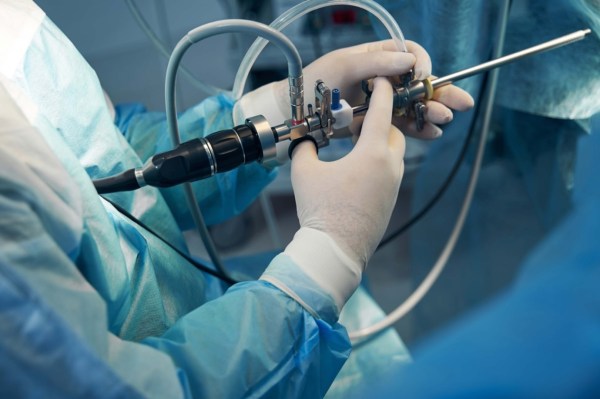
Medicines:
What would largely be the conventional approach could involve pain relief medications, hormonal therapies, including COC (Combined Oral Contraceptive) MIRENA, progestogens in the form of oral tablets, minipills, injections or implants and gonadotropin-releasing hormone (GnRH) agonists to help manage symptoms, while providing relief to reduce the growth of endometrial tissue.
Lifestyle Changes:
From yoga to dietary changes in lifestyle, carefully scheduled exercises and walks to a variety of proven stress management techniques which is more an ‘inner’ approach, the focus is to naturally relieve the symptoms and lessen the chances of endometriosis.
Fertility Treatments:
There are a large percentage of women in the UAE struggling with pregnancy disorders and infertility caused by endometriosis. A popular approach that’s graining ground is assisted reproductive technologies like in-vitro fertilization (IVF) which are proven techniques.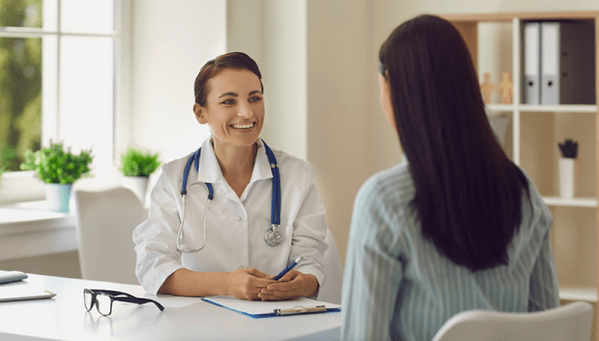
In sum, endometriosis demands a more personalized and holistic approach to managing it. Early detection is key and it’s always important to notify your doctor in the very first instance, when experiencing the pain.
One of the biggest issues facing women, given the increased lifestyle and stress are hormone disorders, also called PCOS (Polycystic Ovary Syndrome). There seems to be a confusion among people not knowing what PCOS and Endometriosis are which tends to look similar but are different. You can read more about this in our blog here.
To know more or to book an appointment right away with any of our ear doctors, call 800 2344.








